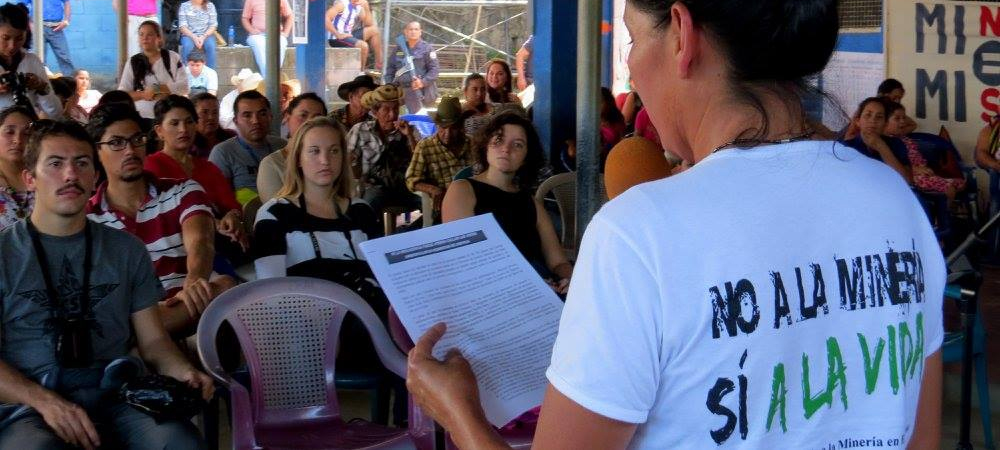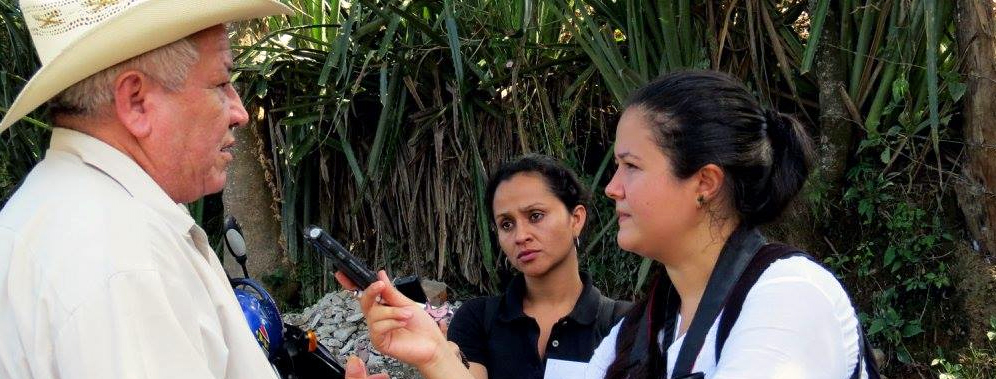As the world celebrated the conclusion of the COP21 talks in Paris, the somber mood in the community of La Maraña, in the northern department of Cabañas of El Salvador, hardly echoes the cheerful worldwide fetes.
 A few days after the signing of the of the accord in December, members of mining affected communities in one of the countries most affected by climate change, have gathered to commemorate the 6th anniversary of the gruesome murder of environmental activists who opposed a gold mining project in their community.
A few days after the signing of the of the accord in December, members of mining affected communities in one of the countries most affected by climate change, have gathered to commemorate the 6th anniversary of the gruesome murder of environmental activists who opposed a gold mining project in their community.
“We are here to denounce the incompetence of the Salvadorean Government for failing to investigate and prosecute these crimes,” states Domingo Miranda, president of La Maraña´s Environmental Association.
Since 2004, members of La Maraña joined with other affected communities, environmental activists, journalist and members of faith based organizations in the organized resistance against the El Dorado mining project owned by Canadian corporation Pacific Rim.
The project had become a palpable threat to their livelihoods and their already fragile environment: “Water wells began to dry out and cattle began to die for no reason, some argue that it was due to the contamination caused by the company during the exploration phase of the mine,” explains Don Domingo.
By 2008, however, communities around the mining project had become divided. Pacific Rim used its financial clout to gain political support by sponsoring local political campaigns, supporting local churches, providing badly needed funding for schools and buying media advertising through their Green Mining campaign. But despite of the millions invested by the company on publicity, concerns raised by anti-mining forces in Cabañas had gained national recognition with the support of the National Roundtable against Metallic Mining and important sectors of society, such as the hierarchy of the Catholic Church, that were calling for a prohibition on all metal mining activities.
“Since 2007, the Bishops Conference has called three times on the Salvadorean Government to prohibit mining” states Bishop Elias Rauda, during a religious service previous to this year’s event in La Maraña. “El Salvador has no conditions for metal mining and we feel it is important to keep alive the memory of those who died defending the environment”
But divided loyalties generated tensions in the communities surrounding the mining project and by 2006 environmental defenders began to report anonymous death threats against their lives and the lives of their relatives.
The violence escalated in June 2009 when community leader and vocal anti-mining activist Marcelo Rivera went missing. His body was found two weeks later in the town of San Isidro, hidden inside a water well, with signs of torture.
The community of La Maraña also experienced its share of violence. In December 2009, Ramiro Rivera Gómez, Vice President of the Cabañas Environmental Committee, was shot to death along with a woman who had hitched a ride in the pick up truck where he travelled; and six days later, Dora Alicia Recinos Sorto and her unborn child were also murdered in La Maraña.
Later, in June 2011, Juan Francisco Durán Ayala, a volunteer with the Cabañas Environmental Committee, was also murdered.

Although the string of murders ceased in 2011, mainly due to local and international pressure and the intervention of the Inter American Commission on Human Rights which instructed the Salvadoran government to ensure the safety and security of environmental activists, death threats and other acts of intimidation have continued to occur over the years: journalists from Radio Victoria, a community radio active in the resistance against Pacific Rim continued to receive death threats an intimidation notes until 2013; in October 2013 environmental activist Alejandro Guevara survived an attempted murder at his “safe” house in the town of Ilobasco; and more recently, activists from the Cabañas Environmental Committee publicly denounced death threats received by their members.
All these acts of violence have remained in impunity.
Vidalina Morales, president of the Association for the Development of El Salvador, ADES, faults the corrupt justice system in El Salvador. During her speech at the commemoration she reads a prepared statement from ADES which demands from the Attorney General’s Office a “full report on the status of the investigations of the murders in Cabañas”.
The statement also points to the fact that the office has refused to investigate a lead to a potential intellectual author of the murders in cabañas. “Rodrigo Chavez, vice president of Pacific Rim while the murders took place and currently in jail for the dismemberment of a municipal employee, must be investigated as a possible intellectual author of the crimes” the statement reads.
Chavez is the son of a known politician who once was the Minister of External Affairs of El Salvador. He was caught in the act with ample evidence for a conviction, yet he was afforded all the clemencies of the legal system. Only one year after he was convicted to ten years in prison, he was granted a release by a judge pending a review of his case. But the public outcry was so loud that the ruling was immediately overturned by a higher level court.
The Attorney General “needs to straighten his priorities and investigate the role of the company’s employees in the murders” Morales states. “We know that Rodrigo Chavez was personally involved in directing the activities of the company in Cabañas and what we know about his character should be sufficient to make him a suspect” Morales says.
Law suit against El Salvador one of the longest running cases in the history of ICSID
But, climate change and the legal system in El Salvador may not be the only odds that members of La Maraña are against. Far away, in Washington DC, a three person tribunal far removed from the reality of their community may soon decide whether their aspiration to keep a polluting mining company out their territory is a violation of international investment laws.
When President Mauricio Funes announced an administrative freeze on mining related permits in 2009, Pacific Rim launched a lawsuit against the government of El Salvador for $77 million dollars.
Despite of the fact the company had failed to meet regulatory requirements to obtain a permit for its El Dorado project, Pacific Rim utilized little known investor protection provisions within the Central America Free Trade Agreement, and later the Salvadorean investment law, to argue that it was entitled to such compensation because the decision not to extend the permit was political. The company quickly ran into financial troubles and failed to raise further investments to sustain a high profile law suit. In 2013 it sold its assets, including the law suit against El Salvador, to Australian based OceanaGold, which raised the stakes and demanded $315 million US dollars from El Salvador.
This case has dragged on for a long time and has cost the Salvadorean public purse over 12 million dollars in legal expenses. The final hearing on the merits phase took place on September 2014, but 16 months after the hearing, the tribunal has not issued a ruling or given any signs that intends to issue a ruling soon.
This delay has already made the case of OcenaGold-PacRim vs El Salvador one of the longest running cases in the ICSID. An article published in the Global Arbitration Review argues that the five longest running cases in the history of ICSID go from 6.3 years to 10.5 years. Considering that Pacific Rim submitted its request for arbitration proceedings on June 15, 2009, we can safely say this case has already taken the number 5 spot on the list, with 6.5 years in waiting. Also, at the time of publishing of this article, the case would have already surpassed the average number of days, 472, the panel takes to issue a resolution after the final arguments are heard at the merits stage.
“Who knows if we will ever hear about the Pacific Rim resolution” or “if we will ever get any form of support from our government to deal with the impact of climate change in our communities, what I can tell you is that we once kicked the workers of a foreign mining company out of territory, and we will do it again if they decide to come back” Ms. Morales tells me as we chat and drink a hot bowl of picadillo, beef soup, served at the celebration.
